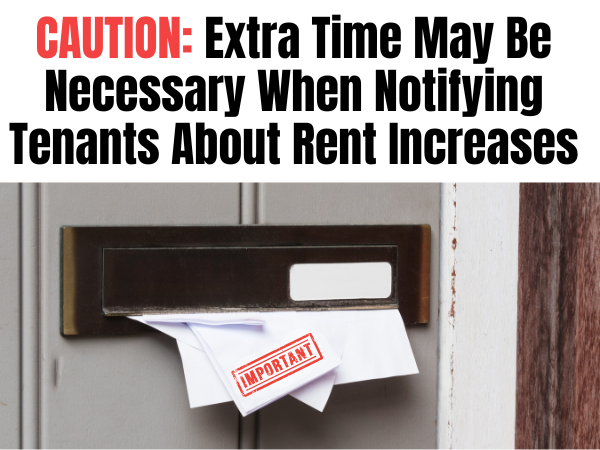CAUTION: Extra Time May Be Necessary When Notifying Tenants About Rent Increases

Suggestion: Use the Forty-Five (45) Day Rule!
An apparently new issue has come up recently that has tenant defense lawyers arguing over the timing of rent increase notices (a/k/a, “change of terms”) that landlords have served on their tenants by both posting (but not personally handing to tenants) and mailing.
- Unless landlords physically hand the rent increase notice to their tenants and send the notice by mail, it is suggested that you add five (5) days to the required thirty (30) day notice period just to be sure.
- In fact, some attorneys have been suggesting that owners make it a practice to send rent increase notices at least forty-five (45) days prior to their effective date.
California Law
Generally, under California law, a landlord must provide a written thirty (30)-day notice to tenants before increasing rent by 10% or less (and ninety (90)-days if more than 10%). The notice of increase must be delivered in writing, either in person, by mail, or posted on the property.
Providing such notice via a phone call, text, or email is not sufficient. The notice period is calculated by excluding the day the notice is received.
- For example, if a notice is received on Monday, the thirty (30)-day period begins on Tuesday. When mailing a notice to a tenant, owners must add five (5)-days to the notice period for a total of thirty-five (35) days.
So, here’s what some attorneys are saying:
- If you post (without physically handing the notice to your tenant) and mail a notice on, for example, July 28th to take effect thirty-four (34) days later on, let’s say, September 1st, your notice may be deemed to be invalid.
- Now, let’s take a look at what might be an example of a “worse-case scenario” – using the same example, but 10 years earlier, then all notices of rent increase may be deemed to be improper notices for each of the ten (10) years thereafter because they are all assumed to be based upon an improper amount from ten (10) years before.
- Accordingly, ALL RENTS collected following the improper rent increase from ten (10) years ago might be deemed improper and owners could be stuck re-setting the rent back to the original, old rent from a decade ago.
- Under these circumstances, then, any rents collected at the deemed “improper” higher amounts would then have to be refunded or credited against new, lower rents giving any tenant so impacted a huge windfall.
- This argument about improper notice may be used against you when seeking to evict a tenant or even used by tenants who are in good standing and who may wish to take a chance at suing you for declaratory relief and disgorgement of “excess rent” and attorney’s fees.
So, make sure you complete, file and keep a proof of service every time you provide your tenants with a rent increase notice, and serve your notices early.
- It is suggested you serve notices of rent increases at least forty-five (45) days in advance if less than a 10% increase, but at a minimum thirty-five (35) days before the increase effective date (excluding the day the notice is served).
(Editor’s Note: There may be hope someday. A case is currently pending on appeal that may determine whether a tenant can waive improper notice by paying the rent increase, assuming it is otherwise lawful. As soon as the outcome of the case is known, we will be certain to let you know!)
About the Apartment Association of Greater Los Angeles (AAGLA):
Serving rental housing providers throughout Southern California since 1917, AAGLA is a leading trade association and government advocate. With over 10,000 members representing more than 350,000 rental units, our community includes rental property owners, managers, developers, real estate professionals, and trusted vendors. AAGLA also offers comprehensive member-exclusive education and training, including weekly webinars, in-person events, Lunch & Learn sessions, and Certificate programs covering legal updates, landlord-tenant laws, insurance, and more.
Not a member of AAGLA? Click here.
